海南省2018年高考试卷英语的
2018年海南省高考英语试卷【Word版】

2018年海南省高考英语试卷第一部分听力(共两节,满分7.5分)第一节(共5小题;每小题 1.5分,满分7.5分)听下面5段对话。
每段对话后有一个小题,从题中所给的A、B、C 三个选项中选出最佳选项。
听完每段对话后,你都有10秒钟的时间来回答有关小题和阅读下一小题。
每段对话仅读一遍。
1.(1.50分)What does John find difficult in learning German?A.Pronunciation.B.Vocabulary.C.Grammar.2.(1.50分)What is the probable relationship between the speakers?A.Colleagues.B.Brother and sister.C.Teather and student.3.(1.50分)Where does the conversation probably take place?A.In a bank.B.At a ticket coffee.C.On the train.4.(1.50分)What are the speakers talking about?A.A restaurant.B.A street.C.A dish.5.(1.50分)How does the woman think of her interview?A.It was tough.B.It was interesting.C It was successful.第二节(共5小题;每小题 1.5分,满分22.5分)听下面5段对话或独白。
每段对话或独白后有几个小题,从题中给的A、B、C三个选项中选出最佳选项。
听完每段对话或独白前,你将有时间阅读各个小题,每小题5秒钟;听完后,各小题将给出5秒钟的作答时间。
每段对话或独白读两遍。
6.(3.00分)听第6段材料,回答下列各题.(1)When will Judy go to a party?A.On Monday.B.On Tuesday.C.On Wednesday.(2)What will Max do next?A.Fly a kite.B.Read a magazine.C.Do his homework.7.(3.00分)听第7段材料,回答下列各题.(1)What does the man suggest doing at first?A.Going to a concert.B.Watching a movie.C.Playing a computer game.(2)What do the speakers decide to do?A.Visit Mike.B.Go boating.C.Talk a walk.8.(4.50分)听第8段材料,回答下列各题.(1)Which color do cats see better than humans?A.Red.B.Green.C.Blue.(2)Why do cats bring dead birds home?A.To eat them in a safe place.B.To show off their hunting skills.C.To make their owners happy.(3)How does the man sound at the end of the conversation?A.Grateful.B.Humorous.C.Curious.9.(6.00分)听第9段材料,回答下列各题.(1)Who is Macy?A.Ed's mother.B.Ed's teacher.C.Ed's friend.(2)How does Ed usually go to kindergarten?A.By car.B.On foot.C.By bus.(3)What does Ed enjoy doing at the kindergarten?A.Telling stories.B.Singing songs.C.Playing with others.(4)What do the teachers say about Ed?A.He's clever.B.He's quiet.C.He's brave.10.(6.00分)听第10段材料,回答下列各题.(1)At what age did Emily start learning ballet?A.Five.B.Six.C.Nine.(2)Why did Emily move to Toronto?A.To work for a dance school.B.To perform at a dance teacher.C.To learn contemporary dance.(3)Why did Emily quit dancing?A.She was too old to dance.B.She failed to get a scholarship.C.She lost interest in it.(4)How does Emily feel about stopping training?A.She's pleased.B.She's regretful.C.She's upset.第二部分阅读理解(共两节,满分30分)第一节(共4小题;每小题6分,满分30分)阅读下列短文,从每题所给的A、B、C和D四个选项中,选出最佳选项。
2018年海南省高考英语试卷【精】

2018年海南省高考英语试卷第一部分听力(共两节,满分7.5分)第一节(共5小题;每小题1.5分,满分7.5分)听下面5段对话。
每段对话后有一个小题,从题中所给的A、B、C 三个选项中选出最佳选项。
听完每段对话后,你都有10秒钟的时间来回答有关小题和阅读下一小题。
每段对话仅读一遍。
1.(1.50分)What does John find difficult in learning German?A.Pronunciation.B.Vocabulary.C.Grammar.2.(1.50分)What is the probable relationship between the speakers?A.Colleagues.B.Brother and sister.C.Teather and student.3.(1.50分)Where does the conversation probably take place?A.In a bank.B.At a ticket coffee.C.On the train.4.(1.50分)What are the speakers talking about?A.A restaurant.B.A street.C.A dish.5.(1.50分)How does the woman think of her interview?A.It was tough.B.It was interesting.C It was successful.第二节(共5小题;每小题1.5分,满分22.5分)听下面5段对话或独白。
每段对话或独白后有几个小题,从题中给的A、B、C三个选项中选出最佳选项。
听完每段对话或独白前,你将有时间阅读各个小题,每小题5秒钟;听完后,各小题将给出5秒钟的作答时间。
每段对话或独白读两遍。
6.(3.00分)听第6段材料,回答下列各题.(1)When will Judy go to a party?A.On Monday.B.On Tuesday.C.On Wednesday.(2)What will Max do next?A.Fly a kite.B.Read a magazine.C.Do his homework.7.(3.00分)听第7段材料,回答下列各题.(1)What does the man suggest doing at first?A.Going to a concert.B.Watching a movie.C.Playing a computer game.(2)What do the speakers decide to do?A.Visit Mike.B.Go boating.C.Talk a walk.8.(4.50分)听第8段材料,回答下列各题.(1)Which color do cats see better than humans?A.Red.B.Green.C.Blue.(2)Why do cats bring dead birds home?A.To eat them in a safe place.B.To show off their hunting skills.C.To make their owners happy.(3)How does the man sound at the end of the conversation?A.Grateful.B.Humorous.C.Curious.9.(6.00分)听第9段材料,回答下列各题.(1)Who is Macy?A.Ed's mother.B.Ed's teacher.C.Ed's friend.(2)How does Ed usually go to kindergarten?A.By car.B.On foot.C.By bus.(3)What does Ed enjoy doing at the kindergarten?A.Telling stories.B.Singing songs.C.Playing with others.(4)What do the teachers say about Ed?A.He's clever.B.He's quiet.C.He's brave.10.(6.00分)听第10段材料,回答下列各题.(1)At what age did Emily start learning ballet?A.Five.B.Six.C.Nine.(2)Why did Emily move to Toronto?A.To work for a dance school.B.To perform at a dance teacher.C.To learn contemporary dance.(3)Why did Emily quit dancing?A.She was too old to dance.B.She failed to get a scholarship.C.She lost interest in it.(4)How does Emily feel about stopping training?A.She's pleased.B.She's regretful.C.She's upset.第二部分阅读理解(共两节,满分30分)第一节(共4小题;每小题6分,满分30分)阅读下列短文,从每题所给的A、B、C和D四个选项中,选出最佳选项。
2018年海南省高考英语试卷
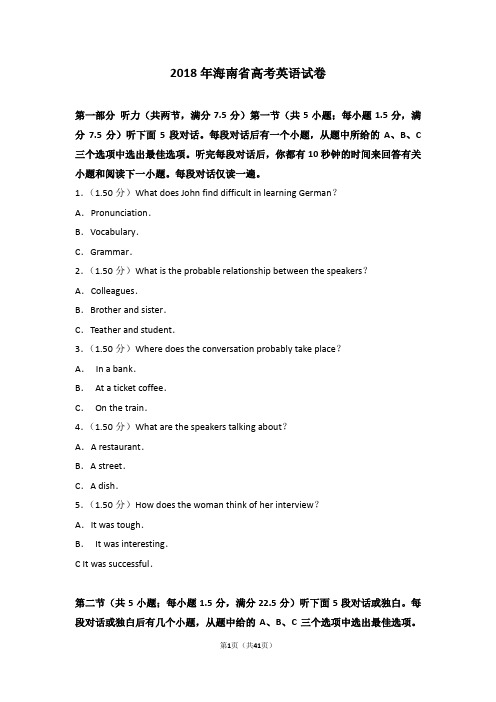
2018年海南省高考英语试卷第一部分听力(共两节,满分7.5分)第一节(共5小题;每小题1.5分,满分7.5分)听下面5段对话。
每段对话后有一个小题,从题中所给的A、B、C 三个选项中选出最佳选项。
听完每段对话后,你都有10秒钟的时间来回答有关小题和阅读下一小题。
每段对话仅读一遍。
1.(1.50分)What does John find difficult in learning German?A.Pronunciation.B.Vocabulary.C.Grammar.2.(1.50分)What is the probable relationship between the speakers?A.Colleagues.B.Brother and sister.C.Teather and student.3.(1.50分)Where does the conversation probably take place?A.In a bank.B.At a ticket coffee.C.On the train.4.(1.50分)What are the speakers talking about?A.A restaurant.B.A street.C.A dish.5.(1.50分)How does the woman think of her interview?A.It was tough.B.It was interesting.C It was successful.第二节(共5小题;每小题1.5分,满分22.5分)听下面5段对话或独白。
每段对话或独白后有几个小题,从题中给的A、B、C三个选项中选出最佳选项。
听完每段对话或独白前,你将有时间阅读各个小题,每小题5秒钟;听完后,各小题将给出5秒钟的作答时间。
每段对话或独白读两遍。
6.(3.00分)听第6段材料,回答下列各题.(1)When will Judy go to a party?A.On Monday.B.On Tuesday.C.On Wednesday.(2)What will Max do next?A.Fly a kite.B.Read a magazine.C.Do his homework.7.(3.00分)听第7段材料,回答下列各题.(1)What does the man suggest doing at first?A.Going to a concert.B.Watching a movie.C.Playing a computer game.(2)What do the speakers decide to do?A.Visit Mike.B.Go boating.C.Talk a walk.8.(4.50分)听第8段材料,回答下列各题.(1)Which color do cats see better than humans?A.Red.B.Green.C.Blue.(2)Why do cats bring dead birds home?A.To eat them in a safe place.B.To show off their hunting skills.C.To make their owners happy.(3)How does the man sound at the end of the conversation?A.Grateful.B.Humorous.C.Curious.9.(6.00分)听第9段材料,回答下列各题.(1)Who is Macy?A.Ed's mother.B.Ed's teacher.C.Ed's friend.(2)How does Ed usually go to kindergarten?A.By car.B.On foot.C.By bus.(3)What does Ed enjoy doing at the kindergarten?A.Telling stories.B.Singing songs.C.Playing with others.(4)What do the teachers say about Ed?A.He's clever.B.He's quiet.C.He's brave.10.(6.00分)听第10段材料,回答下列各题.(1)At what age did Emily start learning ballet?A.Five.B.Six.C.Nine.(2)Why did Emily move to Toronto?A.To work for a dance school.B.To perform at a dance teacher.C.To learn contemporary dance.(3)Why did Emily quit dancing?A.She was too old to dance.B.She failed to get a scholarship.C.She lost interest in it.(4)How does Emily feel about stopping training?A.She's pleased.B.She's regretful.C.She's upset.第二部分阅读理解(共两节,满分30分)第一节(共4小题;每小题6分,满分30分)阅读下列短文,从每题所给的A、B、C和D四个选项中,选出最佳选项。
2018年海南省高考英语试卷【精】

2018年海南省高考英语试卷第一部分听力(共两节,满分7.5分)第一节(共5小题;每小题1.5分,满分7.5分)听下面5段对话。
每段对话后有一个小题,从题中所给的A、B、C 三个选项中选出最佳选项。
听完每段对话后,你都有10秒钟的时间来回答有关小题和阅读下一小题。
每段对话仅读一遍。
1.(1.50分)What does John find difficult in learning German?A.Pronunciation.B.Vocabulary.C.Grammar.2.(1.50分)What is the probable relationship between the speakers?A.Colleagues.B.Brother and sister.C.Teather and student.3.(1.50分)Where does the conversation probably take place?A.In a bank.B.At a ticket coffee.C.On the train.4.(1.50分)What are the speakers talking about?A.A restaurant.B.A street.C.A dish.5.(1.50分)How does the woman think of her interview?A.It was tough.B.It was interesting.C It was successful.第二节(共5小题;每小题1.5分,满分22.5分)听下面5段对话或独白。
每段对话或独白后有几个小题,从题中给的A、B、C三个选项中选出最佳选项。
听完每段对话或独白前,你将有时间阅读各个小题,每小题5秒钟;听完后,各小题将给出5秒钟的作答时间。
每段对话或独白读两遍。
6.(3.00分)听第6段材料,回答下列各题.(1)When will Judy go to a party?A.On Monday.B.On Tuesday.C.On Wednesday.(2)What will Max do next?A.Fly a kite.B.Read a magazine.C.Do his homework.7.(3.00分)听第7段材料,回答下列各题.(1)What does the man suggest doing at first?A.Going to a concert.B.Watching a movie.C.Playing a computer game.(2)What do the speakers decide to do?A.Visit Mike.B.Go boating.C.Talk a walk.8.(4.50分)听第8段材料,回答下列各题.(1)Which color do cats see better than humans?A.Red.B.Green.C.Blue.(2)Why do cats bring dead birds home?A.To eat them in a safe place.B.To show off their hunting skills.C.To make their owners happy.(3)How does the man sound at the end of the conversation?A.Grateful.B.Humorous.C.Curious.9.(6.00分)听第9段材料,回答下列各题.(1)Who is Macy?A.Ed's mother.B.Ed's teacher.C.Ed's friend.(2)How does Ed usually go to kindergarten?A.By car.B.On foot.C.By bus.(3)What does Ed enjoy doing at the kindergarten?A.Telling stories.B.Singing songs.C.Playing with others.(4)What do the teachers say about Ed?A.He's clever.B.He's quiet.C.He's brave.10.(6.00分)听第10段材料,回答下列各题.(1)At what age did Emily start learning ballet?A.Five.B.Six.C.Nine.(2)Why did Emily move to Toronto?A.To work for a dance school.B.To perform at a dance teacher.C.To learn contemporary dance.(3)Why did Emily quit dancing?A.She was too old to dance.B.She failed to get a scholarship.C.She lost interest in it.(4)How does Emily feel about stopping training?A.She's pleased.B.She's regretful.C.She's upset.第二部分阅读理解(共两节,满分30分)第一节(共4小题;每小题6分,满分30分)阅读下列短文,从每题所给的A、B、C和D四个选项中,选出最佳选项。
2018年海南省高考英语试卷(精选)

2018年海南省高考英语试卷第一部分听力(共两节,满分7.5分)第一节(共5小题;每小题1.5分,满分7.5分)听下面5段对话。
每段对话后有一个小题,从题中所给的A、B、C 三个选项中选出最佳选项。
听完每段对话后,你都有10秒钟的时间来回答有关小题和阅读下一小题。
每段对话仅读一遍。
1.(1.50分)What does John find difficult in learning German?A.Pronunciation.B.Vocabulary.C.Grammar.2.(1.50分)What is the probable relationship between the speakers?A.Colleagues.B.Brother and sister.C.Teather and student.3.(1.50分)Where does the conversation probably take place?A.In a bank.B.At a ticket coffee.C.On the train.4.(1.50分)What are the speakers talking about?A.A restaurant.B.A street.C.A dish.5.(1.50分)How does the woman think of her interview?A.It was tough.B.It was interesting.C It was successful.第二节(共5小题;每小题1.5分,满分22.5分)听下面5段对话或独白。
每段对话或独白后有几个小题,从题中给的A、B、C三个选项中选出最佳选项。
听完每段对话或独白前,你将有时间阅读各个小题,每小题5秒钟;听完后,各小题将给出5秒钟的作答时间。
每段对话或独白读两遍。
6.(3.00分)听第6段材料,回答下列各题.(1)When will Judy go to a party?A.On Monday.B.On Tuesday.C.On Wednesday.(2)What will Max do next?A.Fly a kite.B.Read a magazine.C.Do his homework.7.(3.00分)听第7段材料,回答下列各题.(1)What does the man suggest doing at first?A.Going to a concert.B.Watching a movie.C.Playing a computer game.(2)What do the speakers decide to do?A.Visit Mike.B.Go boating.C.Talk a walk.8.(4.50分)听第8段材料,回答下列各题.(1)Which color do cats see better than humans?A.Red.B.Green.C.Blue.(2)Why do cats bring dead birds home?A.To eat them in a safe place.B.To show off their hunting skills.C.To make their owners happy.(3)How does the man sound at the end of the conversation?A.Grateful.B.Humorous.C.Curious.9.(6.00分)听第9段材料,回答下列各题.(1)Who is Macy?A.Ed's mother.B.Ed's teacher.C.Ed's friend.(2)How does Ed usually go to kindergarten?A.By car.B.On foot.C.By bus.(3)What does Ed enjoy doing at the kindergarten?A.Telling stories.B.Singing songs.C.Playing with others.(4)What do the teachers say about Ed?A.He's clever.B.He's quiet.C.He's brave.10.(6.00分)听第10段材料,回答下列各题.(1)At what age did Emily start learning ballet?A.Five.B.Six.C.Nine.(2)Why did Emily move to Toronto?A.To work for a dance school.B.To perform at a dance teacher.C.To learn contemporary dance.(3)Why did Emily quit dancing?A.She was too old to dance.B.She failed to get a scholarship.C.She lost interest in it.(4)How does Emily feel about stopping training?A.She's pleased.B.She's regretful.C.She's upset.第二部分阅读理解(共两节,满分30分)第一节(共4小题;每小题6分,满分30分)阅读下列短文,从每题所给的A、B、C和D四个选项中,选出最佳选项。
2018年海南省高考英语试卷

2018年海南省高考英语试卷第一部分听力(共两节,满分7.5分)第一节(共5小题;每小题1.5分,满分7.5分)听下面5段对话。
每段对话后有一个小题,从题中所给的A、B、C 三个选项中选出最佳选项。
听完每段对话后,你都有10秒钟的时间来回答有关小题和阅读下一小题。
每段对话仅读一遍。
1.(1.50分)What does John find difficult in learning German?A.Pronunciation.B.Vocabulary.C.Grammar.2.(1.50分)What is the probable relationship between the speakers?A.Colleagues.B.Brother and sister.C.Teather and student.3.(1.50分)Where does the conversation probably take place?A. In a bank.B. At a ticket coffee.C. On the train.4.(1.50分)What are the speakers talking about?A.A restaurant.B.A street.C.A dish.5.(1.50分)How does the woman think of her interview?A.It was tough.B. It was interesting.C It was successful.第二节(共5小题;每小题1.5分,满分22.5分)听下面5段对话或独白。
每段对话或独白后有几个小题,从题中给的A、B、C三个选项中选出最佳选项。
听完每段对话或独白前,你将有时间阅读各个小题,每小题5秒钟;听完后,各小题将给出5秒钟的作答时间。
每段对话或独白读两遍。
6.(3.00分)听第6段材料,回答下列各题.(1)When will Judy go to a party?A.On Monday.B.On Tuesday.C.On Wednesday.(2)What will Max do next?A. Fly a kite.B. Read a magazine.C. Do his homework.7.(3.00分)听第7段材料,回答下列各题.(1)What does the man suggest doing at first?A. Going to a concert.B. Watching a movie.C. Playing a computer game.(2)What do the speakers decide to do?A.Visit Mike.B.Go boating.C.Talk a walk.8.(4.50分)听第8段材料,回答下列各题.(1)Which color do cats see better than humans?A.Red.B.Green.C.Blue.(2)Why do cats bring dead birds home?A. To eat them in a safe place.B. To show off their hunting skills.C. To make their owners happy.(3)How does the man sound at the end of the conversation?A. Grateful.B. Humorous.C. Curious.9.(6.00分)听第9段材料,回答下列各题.(1)Who is Macy?A. Ed's mother.B. Ed's teacher.C. Ed's friend.(2)How does Ed usually go to kindergarten?A. By car.B. On foot.C. By bus.(3)What does Ed enjoy doing at the kindergarten?A. Telling stories.B. Singing songs.C. Playing with others.(4)What do the teachers say about Ed?A. He's clever.B. He's quiet.C. He's brave.10.(6.00分)听第10段材料,回答下列各题.(1)At what age did Emily start learning ballet?A. Five.B. Six.C. Nine.(2)Why did Emily move to Toronto?A. To work for a dance school.B. To perform at a dance teacher.C. To learn contemporary dance.(3)Why did Emily quit dancing?A. She was too old to dance.B. She failed to get a scholarship.C. She lost interest in it.(4)How does Emily feel about stopping training?A. She's pleased.B. She's regretful.C. She's upset.第二部分阅读理解(共两节,满分30分)第一节(共4小题;每小题6分,满分30分)阅读下列短文,从每题所给的A、B、C和D四个选项中,选出最佳选项。
2018年海南省高考英语试卷最新修正版

2018年海南省高考英语试卷第一部分听力(共两节,满分7.5分)第一节(共5小题;每小题1.5分,满分7.5分)听下面5段对话。
每段对话后有一个小题,从题中所给的A、B、C 三个选项中选出最佳选项。
听完每段对话后,你都有10秒钟的时间来回答有关小题和阅读下一小题。
每段对话仅读一遍。
1.(1.50分)What does John find difficult in learning German?A.Pronunciation.B.Vocabulary.C.Grammar.2.(1.50分)What is the probable relationship between the speakers?A.Colleagues.B.Brother and sister.C.Teather and student.3.(1.50分)Where does the conversation probably take place?A.In a bank.B.At a ticket coffee.C.On the train.4.(1.50分)What are the speakers talking about?A.A restaurant.B.A street.C.A dish.5.(1.50分)How does the woman think of her interview?A.It was tough.B.It was interesting.C It was successful.第二节(共5小题;每小题1.5分,满分22.5分)听下面5段对话或独白。
每段对话或独白后有几个小题,从题中给的A、B、C三个选项中选出最佳选项。
听完每段对话或独白前,你将有时间阅读各个小题,每小题5秒钟;听完后,各小题将给出5秒钟的作答时间。
每段对话或独白读两遍。
6.(3.00分)听第6段材料,回答下列各题.(1)When will Judy go to a party?A.On Monday.B.On Tuesday.C.On Wednesday.(2)What will Max do next?A.Fly a kite.B.Read a magazine.C.Do his homework.7.(3.00分)听第7段材料,回答下列各题.(1)What does the man suggest doing at first?A.Going to a concert.B.Watching a movie.C.Playing a computer game.(2)What do the speakers decide to do?A.Visit Mike.B.Go boating.C.Talk a walk.8.(4.50分)听第8段材料,回答下列各题.(1)Which color do cats see better than humans?A.Red.B.Green.C.Blue.(2)Why do cats bring dead birds home?A.To eat them in a safe place.B.To show off their hunting skills.C.To make their owners happy.(3)How does the man sound at the end of the conversation?A.Grateful.B.Humorous.C.Curious.9.(6.00分)听第9段材料,回答下列各题.(1)Who is Macy?A.Ed's mother.B.Ed's teacher.C.Ed's friend.(2)How does Ed usually go to kindergarten?A.By car.B.On foot.C.By bus.(3)What does Ed enjoy doing at the kindergarten?A.Telling stories.B.Singing songs.C.Playing with others.(4)What do the teachers say about Ed?A.He's clever.B.He's quiet.C.He's brave.10.(6.00分)听第10段材料,回答下列各题.(1)At what age did Emily start learning ballet?A.Five.B.Six.C.Nine.(2)Why did Emily move to Toronto?A.To work for a dance school.B.To perform at a dance teacher.C.To learn contemporary dance.(3)Why did Emily quit dancing?A.She was too old to dance.B.She failed to get a scholarship.C.She lost interest in it.(4)How does Emily feel about stopping training?A.She's pleased.B.She's regretful.C.She's upset.第二部分阅读理解(共两节,满分30分)第一节(共4小题;每小题6分,满分30分)阅读下列短文,从每题所给的A、B、C和D四个选项中,选出最佳选项。
2018年海南高考英语真题及答案

2018年海南高考英语真题及答案(考试时间:120分钟试卷满分:150分)注意事项:1. 答卷前,考生务必将自己的姓名、准考证号填写在答题卡上。
2. 作答时,务必将答案写在答题卡上,写在本试卷及草稿纸上无效。
3. 考试结束后,将本试卷和答题卡一并交回。
第一部分听力(共两节,满分30分)做题时,先将答案标在试卷上。
录音内容结束后,你将有两分钟的时间将试卷上的答案转涂到答题卡上。
第一节(共5小题;每小题1.5分,满分7.5分)听下面5短对话,每段对话后有一个小题,从题中给的A、B、C三个选项中选出最佳选项。
听完每段对话后,你都有10秒钟的时间来回答有关小题和阅读下一小题。
每段对话仅读一遍。
例:How much is theshirt?A.£19.15.B.£9.18.C.£9.15.1. What does John find difficult in learning German?A.Pronunciation.B.Vocabulary.C.Grammar.2.What is the probable relationship between the speakers?A.Colleagues.B.Brother and sister.C.Teacher and student.3.Where does the conversation probably take place?A. In a bank.B. At a ticket office.C. On a train.4. What are the speakers talking about?A. A restaurant.B.A street.C.A dish.5.What does the woman think of her interview?A.It was tough.B.It was interesting.C.It was successful.第二节(共15小题;每小题1.5分,满分22.5分)听下面5段对话或独白,每段对话或独白后有几个小题,从题中所给的A、B、C三个选项中选出最佳选项。
2018年海南卷高考真题英语

14. How does Ed usually go to kindergarten
C. Ed’ s frien.d
A. By car.
B. On foot.
C. By bus.
15. What does Ed enjoy doing at the kindergarten
A. Telling stories.
B. Read a magazine.
C. Do his homework.
8. What does the man suggest doing at first
A. Going to a concert.
B. Watching a movie.
C. Playing a computer game.
Paris park, staying until late to see the parade and the fireworks. Our
final day, Friday, sees us visit central Paris and tour the main sights.
Crafty Foxes (CRF)
B. Singing songs.
C. Playing with others.
16. What do the teachers say about Ed
A. He’ s cleve. r
B. He’ s quie. t
听第 10 段材料,回答第 17 至 20 题。
C. He’ s brav.e
17. At what age did Emily start learning ballet
B. Green.
C. Blue.
2018年普通高等学校招生全国统一考试(海南卷)英语(解析版)

2018年普通高等学校招生全国统一考试(海南卷)英语一、阅读理解(本大题共15小题,共30.0分)AC Teens and younger children are reading a lot less for fun,according to a Common Sense Media report published Monday.While the decline over the past decade is steep for teen readers,some data in the report shows that reading remains a big part of many chidren's lives,and indicates how parents might help encourage more reading.According to the report's key findings,"the proportion (比例)who say they ‘hardly ever' read for fun has gone from 8 percent of 13-year-olds and 9 percent of 17-year-olds in 1984 to 22 percent 27 percent respectively today." The report data shows that pleasure reading levels for younger children,ages 2-8,remain largely the same.But the amount of time spent in reading each session has declined,from closer to an hour or more to closer to a half hour per session.When it comes to technology and reading,the report does little to counsel(建议)parents looking for data about the effect of e-readers and tablets on reading.It does point out that many parents still limit electronic reading,mainly due to concerns about increased screen time.The most hopeful data shared in the report shows clear evidence of parents serving as examples and important guides for their kids when it comes to reading.Data shows that kids and teens who do read frequently,compared to infrequent readers,have more books in the home,more books purchased for them,parents who read more often,and parents who set aside time for them to read.As the end of school approaches,and school vacation reading lists loom(逼近)ahead,parents might take this chance to step in and make their own summer reading list and plan a family trip to the library or bookstore.1. What is the Common Sense Media report probably about?______A. Children's reading habits.B. Quality of children's books.C. Children's after-class activities.D. Parent-child relationships.2. Where can you find the data that best supports "children are reading a lot less for fun"?______A. In paragraph 2.B. In paragraph 3.C. In paragraph 4.D. In paragraph 5.3. Why do many parents limit electronic reading?______A. E-books are of poor quality.B. It could be waste of time.C. It may harm children's health.D. E-readers are expensive.4. How should parents encourage their children to read more?______A. Act as role models for them.B. Ask them to write book reports.C. Set up reading groups for them.D. Talk with their reading class teachers.【答案】【小题1】A 【小题2】B 【小题3】C 【小题4】A【解析】ABCA1.A推理判断题.根据文章第一段Teens and younger children are reading a lot less for fun, according to a Common Sense Media report published Monday可知Common Sense Media的结论是青少年阅读量比以前少了许多,可以推断该媒体做的是关于儿童的阅读习惯的报道,故答案为A.2.B.推理判断题.根据第三段the proportion (比例) who say they ‘hardly ever' read for fun has gone from 8 percent of 13-year-olds and 9 percent of 17-year-olds in 1984 to 22 percent 27 percent respectively today可知青少年几乎不阅读的比列由1984年的8%和9%分别上升到现在的22%和27%,可以得出的结论是现在的青少年阅读量比以前少了许多,故答案为B.3.C.细节理解题.根据It does point out that many parents still limit electronic reading,mainly due to concerns about increased screen time家中限制孩子进行电子阅读的原因很大程度上是担心电子产品对身体的危害,故答案为C.4.A.推理判断题.根据Data shows that kids and teens who do read frequently,compared to infrequent readers,have more books in the home,more books purchased for them,parents who read more often,and parents who set aside time for them to read可知孩子经常阅读的家长也会经常读书,说明了家长的榜样作用,可以得知家长要鼓励自己的孩子多读书,首先自己也要拿起课本,多读书才行,故答案为A.本文属于社会文化类阅读,根据Common Sense Media的调查报道可知,现在的青少年阅读量比以前少了许多,需要引起社会及家长的重视,需要营造阅读的环境,同时家长也要做好示范作用,积极地参与到阅读当中来.做这类题材阅读理解时要求考生对文章通读一遍,做题时结合原文和题目有针对性的找出相关语句进行仔细分析,结合选项选出正确答案.推理判断题也是要在抓住关键句子的基础上合理的分析才能得出正确答案,切忌胡乱猜测,一定要做到有理有据.BD We've all been there:in a lift,in line at the bank or on airplane,surrounded by people who are,like us,deeply focused on their smartphones or,worse,struggling with the uncomfortable silence.What's the problem?It's possible that we all have compromised conversational intelligence.It's more likely that none of us start a conversation because it's awkward and challenging,or we think it's annoying and unnecessary.But the next time you find yourself among strangers,consider that small talk is worth the trouble.Experts say it's an invaluable social practice that results in big benefits.Dismissing small talk as unimportant is easy,but we can't forget that deep relationships wouldn't even exist if it weren't for casual conversation.Small talk is the grease (润滑剂)for social communication,says Bernardo Carducci,director of the Shyness Research Institute at Indiana University Southeast."Almost every great love story and each big business deal begins with small talk," he explains."The key to successful small talk is learning how to connect with others,not just communicate with them."In a 2014 study,Elizabeth Dunn,associate professor of psychology at UBC,invited people on their way into a coffee shop.One group was asked to seek out an interaction(互动)with its waiter;the other,to speak only when necessary.The results showed that those who chatted with their server reported significantly higher positive feelings and a better coffee shop experience."It's not that talking to the waiter is better than talking to your husband," says Dunn."But interactions with peripheral(边缘的)members of our social network matter for our well-being also."Dunn believes that people who reach out to strangers feel a significantly greater sense of belonging,a bond with others.Carducci believes developing such a sense of belonging starts with small talk."Small talk is the basis of good manners," he says.5. What phenomenon is described in the first paragraph?______A. Addiction to smartphones.B. Inappropriate behaviours in public places.C. Absence of communication between strangers.D. Impatience with slow service.6. What is important for successful small talk according to Carducci?______A. Showing good manners.B. Relating to other people.C. Focusing on a topic.D. Making business deals.7. What does the coffee-shop study suggest about small talk?______A. It improves family relationships.B. It raises people's confidence.C. It matters as much as a formal talk.D. It makes people feel good.8. What is the best title for the text?______A. Conversation CountsB. Ways of Making Small TalkC. Benefits of Small TalkD. Uncomfortable Silence【答案】【小题1】C 【小题2】B 【小题3】D 【小题4】C【解析】CBDC1.C.细节理解题.根据文章第一段可知,该段描述的情景是人们在公共场所不是玩手机就是尴尬地沉默,没有和其他人交流.C项意为"不与陌生人交流".符合原文描述.故C项正确.A项意为"沉迷智能手机".这只是作者描绘的场景之一,故A项错误.B项意为"公众场合不良行为".文中未提及.故B项错误.D项意为"对低效的服务不耐烦".文中未提及.故D项错误.故正确答案为C.2.B.细节理解题.根据文章第三段最后一句话 The key to successful small talk is learning how to connect with others, not just communicate with them 可知,成功的关键是与他人产生联结.故正确答案为B.3.D.细节理解题.根据文章第四段第三句 The results showed that those who chatted with their server reported significantly higher positive feelings and a better coffee shop experience 可知,与店员交谈后的顾客会对服务更满意,且对在咖啡店的服务体验更满意.故正确答案为D.4.C.标题判断题.根据文章可知,作者从公共场合人与人极少交谈的场景开始,逐步论述闲聊的益处.故本题答案应围绕"闲聊的益处"展开.A项,意为"对话很重要".B项,意为"闲聊的方法".C项,意为"闲聊的益处".D项,意为"令人不适的寂静".故正确答案为C.本文是一篇人生感悟类阅读,作者围绕闲聊的益处展开论述,从公共场合人与人极少交谈的场景开始,逐步论述了闲聊的益处.做这类题材阅读理解时要求考生对文章通读一遍,做题时结合原文和题目有针对性的找出相关语句进行仔细分析,结合选项选出正确答案.推理判断题也是要在抓住关键句子的基础上合理的分析才能得出正确答案,切忌胡乱猜测,一定要做到有理有据.CA Summer Activities Students should read the list with their parents/carers,and select two activities they would like to do.Forms will be available in school and online for them to indicate their choices and return to school.BeforeA. OUT.B. WBP.C. CRF.D. POT.10. What will the students do on Tuesday with Mrs.Wilson?______A. Travel to London.B. See a parade and fireworks.C. Tour Central Paris.D. Visit the WWI battlefields.11. How long does Potty about Potter last?______A. Two days.B. Four days.C. Five days.D. One week.【答案】【小题1】A 【小题2】D 【小题3】A【解析】ADA1.A.细节理解题.根据Your will be able to take part in a number of activities from canoeing to wild camping on Dartmoot可知学生可以参加许多的活动,可以乘坐皮划艇到达营地,有此可知如果要野营需要参加Outdoor Advcature (OUT),故答案为A.2.D.细节理解题.根据WWI Battlefields and Paris(WBP)中After staying overnight in London,we travel on Day 2 to northern France to visit the World War I battlefields可知,第二天也就是周二去法国北部参观一战战场,故答案为D.3.A.细节理解题.根据Potty about Potter(POT)中Visit Warn Bros Studio,shop to buy pienic,stay overnight in an approved Youth Hostel in Streatlry-on -Thames可知需要待上一晚,最后回到Exeter,可以判断活动要持续两天,故答案为A.本文是广告布告类阅读,介绍了四个夏季学生可以参加的活动,具体介绍了名称,具体的活动信息,带队负责人及价格等.做这类题材阅读理解时要求考生对文章通读一遍,做题时结合原文和题目有针对性的找出相关语句进行仔细分析,结合选项选出正确答案.推理判断题也是要在抓住关键句子的基础上合理的分析才能得出正确答案,切忌胡乱猜测,一定要做到有理有据.DMany of us love July because it's the month when nature's berries and stone fruits are in abundance. These colourful and sweet jewels from British Columbia's fields are little powerhouses of nutritional protection.Of the common berries, strawberries are highest in vitamin C, although, because of their seeds, raspberries contain a little more protein (蛋白质), iron and zinc(not that fruits have much protein). Blueberries are particularly high in antioxidants (抗氧化物质). The yellow and orange stone fruits such as peaches are high in the carotenoids we turn into vitamin A and which are antioxidants. As for cherries (樱桃), they are so delicious who cares? However, they are rich in vitamin C.When combined with berries or slices of other fruits, frozen bananas make an excellent base for thick, cooling fruit shakes and low fat “ice cream”. For this purpose, select ripe bananas for freezing as they are much sweeter. Remove the skin and place them in plastic bags or containers and freeze. If you like, a squeeze of fresh lemon juice on the bananas will prevent them turning brown. Frozen bananas will last several weeks, depending on their ripenessand the temperature of the freezer.If you have a juicer, you can simply feed in frozen bananas and some berries or sliced fruit. Out comes a“soft-serve” creamy dessert, to be eaten right away. This makes a fun activity for a children's party; they love feeding the fruit and frozen bananas into the top of the machine and watching the ice cream come out below.12. What does the author seem to like about cherries?A. They contain, protein.B. They are high in vitamin A.C. They have a pleasant taste.D. They are rich in antioxidants.13. Why is fresh lemon juice, used in freezing bananas?A. To make them smell better.B. To keep their colour.C. To speed up their ripening.D. To improve their nutrition.14. What is “a juicer” in the last paragraph?A. A dessert.B. A drink.C. A container.D. A machine.15. From which is the text probably taken?A. A biology textbook.B. A health magazine.C. A research paper.D. A travel brochure.【答案】【小题1】C 【小题2】B 【小题3】D 【小题4】B【解析】【文章大意】本文介绍了很多人喜欢七月是因为这个时间是大量水果上市的季节,接着具体介绍了各种水果所富含的营养成分,及如何制作水果冰淇淋。
2018年海南省高考英语试卷
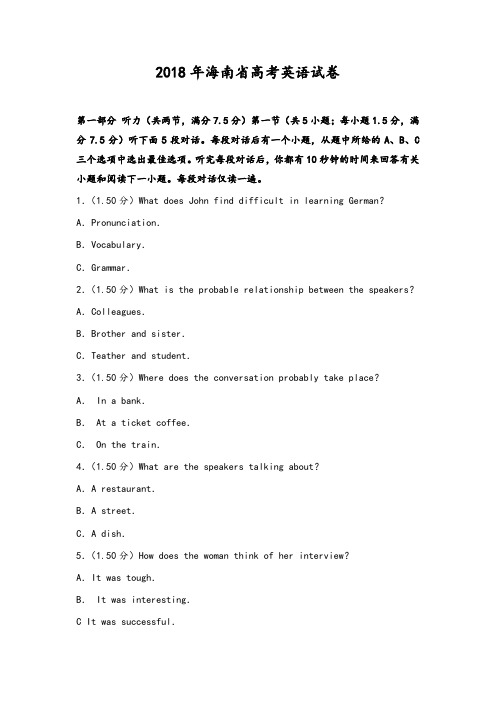
2018年海南省高考英语试卷第一部分听力(共两节,满分7.5分)第一节(共5小题;每小题1.5分,满分7.5分)听下面5段对话。
每段对话后有一个小题,从题中所给的A、B、C 三个选项中选出最佳选项。
听完每段对话后,你都有10秒钟的时间来回答有关小题和阅读下一小题。
每段对话仅读一遍。
1.(1.50分)What does John find difficult in learning German?A.Pronunciation.B.Vocabulary.C.Grammar.2.(1.50分)What is the probable relationship between the speakers?A.Colleagues.B.Brother and sister.C.Teather and student.3.(1.50分)Where does the conversation probably take place?A. In a bank.B. At a ticket coffee.C. On the train.4.(1.50分)What are the speakers talking about?A.A restaurant.B.A street.C.A dish.5.(1.50分)How does the woman think of her interview?A.It was tough.B. It was interesting.C It was successful.第二节(共5小题;每小题1.5分,满分22.5分)听下面5段对话或独白。
每段对话或独白后有几个小题,从题中给的A、B、C三个选项中选出最佳选项。
听完每段对话或独白前,你将有时间阅读各个小题,每小题5秒钟;听完后,各小题将给出5秒钟的作答时间。
每段对话或独白读两遍。
6.(3.00分)听第6段材料,回答下列各题.(1)When will Judy go to a party?A.On Monday.B.On Tuesday.C.On Wednesday.(2)What will Max do next?A. Fly a kite.B. Read a magazine.C. Do his homework.7.(3.00分)听第7段材料,回答下列各题.(1)What does the man suggest doing at first?A. Going to a concert.B. Watching a movie.C. Playing a computer game.(2)What do the speakers decide to do?A.Visit Mike.B.Go boating.C.Talk a walk.8.(4.50分)听第8段材料,回答下列各题.(1)Which color do cats see better than humans?A.Red.B.Green.C.Blue.(2)Why do cats bring dead birds home?A. To eat them in a safe place.B. To show off their hunting skills.C. To make their owners happy.(3)How does the man sound at the end of the conversation?A. Grateful.B. Humorous.C. Curious.9.(6.00分)听第9段材料,回答下列各题.(1)Who is Macy?A. Ed's mother.B. Ed's teacher.C. Ed's friend.(2)How does Ed usually go to kindergarten?A. By car.B. On foot.C. By bus.(3)What does Ed enjoy doing at the kindergarten?A. Telling stories.B. Singing songs.C. Playing with others.(4)What do the teachers say about Ed?A. He's clever.B. He's quiet.C. He's brave.10.(6.00分)听第10段材料,回答下列各题.(1)At what age did Emily start learning ballet?A. Five.B. Six.C. Nine.(2)Why did Emily move to Toronto?A. To work for a dance school.B. To perform at a dance teacher.C. To learn contemporary dance.(3)Why did Emily quit dancing?A. She was too old to dance.B. She failed to get a scholarship.C. She lost interest in it.(4)How does Emily feel about stopping training?A. She's pleased.B. She's regretful.C. She's upset.第二部分阅读理解(共两节,满分30分)第一节(共4小题;每小题6分,满分30分)阅读下列短文,从每题所给的A、B、C和D四个选项中,选出最佳选项。
2018年海南卷高考真题英语

第一部分听力(共两节,满分30分)第一节(共5小题;每小题分,满分分)听下面5短对话,每段对话后有一个小题,从题中给的A、B、C三个选项中选出最佳选项。
听完每段对话后,你都有10秒钟的时间来回答有关小题和阅读下一小题。
每段对话仅读一遍。
例:How much is the shirtA. £.B. £.C. £.1. What does John find difficult in learning GermanA. Pronunciation.B. Vocabulary.C. Grammar.2. What is the probable relationship between the speakersA. Colleagues.B. Brother and sister.C. Teacher and student.3. Where does the conversation probably take placeA. In a bank.B. At a ticket office.C. On a train.4. What are the speakers talking aboutA. A restaurant.B. A street.C. A dish.does the woman think of her interviewA. It was tough.B. It was interesting.C. It was successful.第二节(共15小题;每小题分,满分分)听下面5段对话或独白,每段对话或独白后有几个小题,从题中所给的A、B、C三个选项中选出最佳选项。
听每段对话或独白前,你将有时间阅读各个小题,每小题5秒钟;听完后,各小题将给出5秒钟的作答时间。
每段对话或独白读两遍。
听第6段材料,回答第6、7题。
6. When will Judy go to a partyA. On Monday.B. On Tuesday.C. On Wednesday.7. What will Max do nextA. Fly a kite.B. Read a magazine.C. Do his homework.听第7段材料,回答第8、9题。
2018年海南省高考英语试题与答案
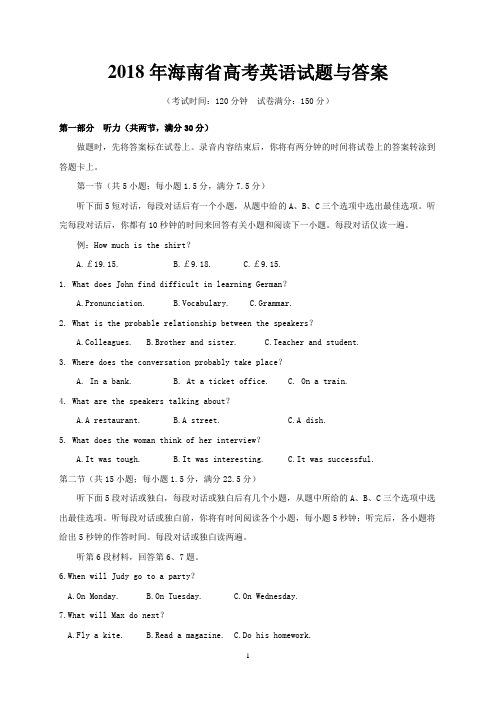
2018年海南省高考英语试题与答案(考试时间:120分钟试卷满分:150分)第一部分听力(共两节,满分30分)做题时,先将答案标在试卷上。
录音内容结束后,你将有两分钟的时间将试卷上的答案转涂到答题卡上。
第一节(共5小题;每小题1.5分,满分7.5分)听下面5短对话,每段对话后有一个小题,从题中给的A、B、C三个选项中选出最佳选项。
听完每段对话后,你都有10秒钟的时间来回答有关小题和阅读下一小题。
每段对话仅读一遍。
例:How much is the shirt?A.£19.15.B.£9.18.C.£9.15.1. What does John find difficult in learning German?A.Pronunciation.B.Vocabulary.C.Grammar.2. What is the probable relationship between the speakers?A.Colleagues.B.Brother and sister.C.Teacher and student.3. Where does the conversation probably take place?A. In a bank.B. At a ticket office.C. On a train.4. What are the speakers talking about?A.A restaurant.B.A street.C.A dish.5. What does the woman think of her interview?A.It was tough.B.It was interesting.C.It was successful.第二节(共15小题;每小题1.5分,满分22.5分)听下面5段对话或独白,每段对话或独白后有几个小题,从题中所给的A、B、C三个选项中选出最佳选项。
2018年海南省高考英语试卷(解析版)

2018年海南省高考英语试卷第一部分听力(共两节,满分7.5分)第一节(共5小题;每小题1.5分,满分7.5分)听下面5段对话。
每段对话后有一个小题,从题中所给的A、B、C三个选项中选出最佳选项。
听完每段对话后,你都有10秒钟的时间来回答有关小题和阅读下一小题。
每段对话仅读一遍。
1.(1.50分)What does John find difficult in learning German?A.Pronunciation.B.Vocabulary.C.Grammar.2.(1.50分)What is the probable relationship between the speakers?A.Colleagues.B.Brother and sister.C.Teather and student.3.(1.50分)Where does the conversation probably take place?A.In a bank.B.At a ticket coffee.C.On the train.4.(1.50分)What are the speakers talking about?A.A restaurant.B.A street.C.A dish.5.(1.50分)How does the woman think of her interview?A.It was tough.B.It was interesting.C It was successful.第二节(共5小题;每小题1.5分,满分22.5分)听下面5段对话或独白。
每段对话或独白后有几个小题,从题中给的A、B、C三个选项中选出最佳选项。
听完每段对话或独白前,你将有时间阅读各个小题,每小题5秒钟;听完后,各小题将给出5秒钟的作答时间。
每段对话或独白读两遍。
6.(3.00分)听第6段材料,回答下列各题.(1)When will Judy go to a party?A.On Monday.B.On Tuesday.C.On Wednesday.(2)What will Max do next?A.Fly a kite.B.Read a magazine.C.Do his homework.7.(3.00分)听第7段材料,回答下列各题.(1)What does the man suggest doing at first?A.Going to a concert.B.Watching a movie.C.Playing a computer game.(2)What do the speakers decide to do?A.Visit Mike.B.Go boating.C.Talk a walk.8.(4.50分)听第8段材料,回答下列各题.(1)Which color do cats see better than humans?A.Red.B.Green.C.Blue.(2)Why do cats bring dead birds home?A.To eat them in a safe place.B.To show off their hunting skills.C.To make their owners happy.(3)How does the man sound at the end of the conversation?A.Grateful.B.Humorous.C.Curious.9.(6.00分)听第9段材料,回答下列各题.(1)Who is Macy?A.Ed's mother.B.Ed's teacher.C.Ed's friend.(2)How does Ed usually go to kindergarten?A.By car.B.On foot.C.By bus.(3)What does Ed enjoy doing at the kindergarten?A.Telling stories.B.Singing songs.C.Playing with others.(4)What do the teachers say about Ed?A.He's clever.B.He's quiet.C.He's brave.10.(6.00分)听第10段材料,回答下列各题.(1)At what age did Emily start learning ballet?A.Five.B.Six.C.Nine.(2)Why did Emily move to Toronto?A.To work for a dance school.B.To perform at a dance teacher.C.To learn contemporary dance.(3)Why did Emily quit dancing?A.She was too old to dance.B.She failed to get a scholarship.C.She lost interest in it.(4)How does Emily feel about stopping training?A.She's pleased.B.She's regretful.C.She's upset.第二部分阅读理解(共两节,满分30分)第一节(共4小题;每小题6分,满分30分)阅读下列短文,从每题所给的A、B、C和D四个选项中,选出最佳选项。
2018年海南省高考英语试卷-高考真题
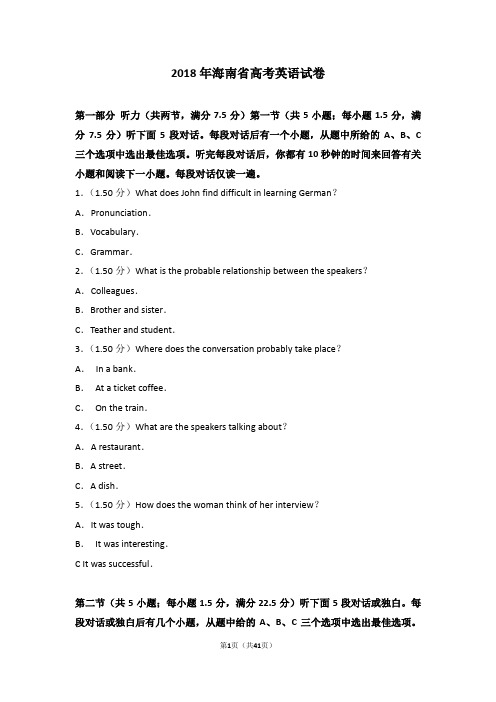
2018年海南省高考英语试卷第一部分听力(共两节,满分7.5分)第一节(共5小题;每小题1.5分,满分7.5分)听下面5段对话。
每段对话后有一个小题,从题中所给的A、B、C 三个选项中选出最佳选项。
听完每段对话后,你都有10秒钟的时间来回答有关小题和阅读下一小题。
每段对话仅读一遍。
1.(1.50分)What does John find difficult in learning German?A.Pronunciation.B.Vocabulary.C.Grammar.2.(1.50分)What is the probable relationship between the speakers?A.Colleagues.B.Brother and sister.C.Teather and student.3.(1.50分)Where does the conversation probably take place?A.In a bank.B.At a ticket coffee.C.On the train.4.(1.50分)What are the speakers talking about?A.A restaurant.B.A street.C.A dish.5.(1.50分)How does the woman think of her interview?A.It was tough.B.It was interesting.C It was successful.第二节(共5小题;每小题1.5分,满分22.5分)听下面5段对话或独白。
每段对话或独白后有几个小题,从题中给的A、B、C三个选项中选出最佳选项。
听完每段对话或独白前,你将有时间阅读各个小题,每小题5秒钟;听完后,各小题将给出5秒钟的作答时间。
每段对话或独白读两遍。
6.(3.00分)听第6段材料,回答下列各题.(1)When will Judy go to a party?A.On Monday.B.On Tuesday.C.On Wednesday.(2)What will Max do next?A.Fly a kite.B.Read a magazine.C.Do his homework.7.(3.00分)听第7段材料,回答下列各题.(1)What does the man suggest doing at first?A.Going to a concert.B.Watching a movie.C.Playing a computer game.(2)What do the speakers decide to do?A.Visit Mike.B.Go boating.C.Talk a walk.8.(4.50分)听第8段材料,回答下列各题.(1)Which color do cats see better than humans?A.Red.B.Green.C.Blue.(2)Why do cats bring dead birds home?A.To eat them in a safe place.B.To show off their hunting skills.C.To make their owners happy.(3)How does the man sound at the end of the conversation?A.Grateful.B.Humorous.C.Curious.9.(6.00分)听第9段材料,回答下列各题.(1)Who is Macy?A.Ed's mother.B.Ed's teacher.C.Ed's friend.(2)How does Ed usually go to kindergarten?A.By car.B.On foot.C.By bus.(3)What does Ed enjoy doing at the kindergarten?A.Telling stories.B.Singing songs.C.Playing with others.(4)What do the teachers say about Ed?A.He's clever.B.He's quiet.C.He's brave.10.(6.00分)听第10段材料,回答下列各题.(1)At what age did Emily start learning ballet?A.Five.B.Six.C.Nine.(2)Why did Emily move to Toronto?A.To work for a dance school.B.To perform at a dance teacher.C.To learn contemporary dance.(3)Why did Emily quit dancing?A.She was too old to dance.B.She failed to get a scholarship.C.She lost interest in it.(4)How does Emily feel about stopping training?A.She's pleased.B.She's regretful.C.She's upset.第二部分阅读理解(共两节,满分30分)第一节(共4小题;每小题6分,满分30分)阅读下列短文,从每题所给的A、B、C和D四个选项中,选出最佳选项。
2018年海南省高考英语试卷-高考
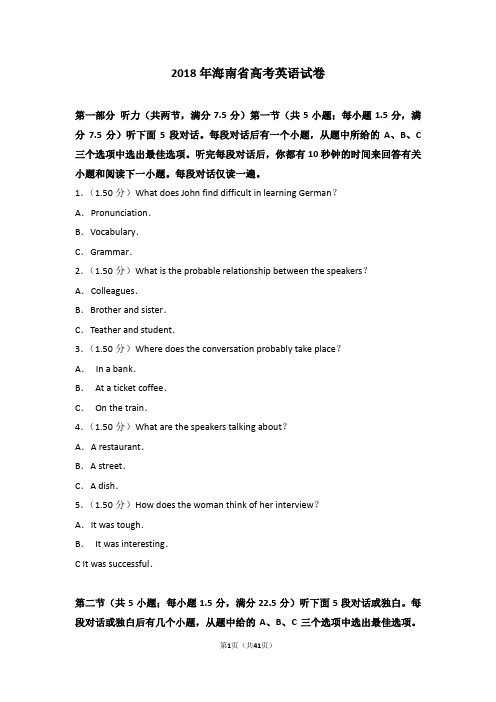
2018年海南省高考英语试卷第一部分听力(共两节,满分7.5分)第一节(共5小题;每小题1.5分,满分7.5分)听下面5段对话。
每段对话后有一个小题,从题中所给的A、B、C 三个选项中选出最佳选项。
听完每段对话后,你都有10秒钟的时间来回答有关小题和阅读下一小题。
每段对话仅读一遍。
1.(1.50分)What does John find difficult in learning German?A.Pronunciation.B.Vocabulary.C.Grammar.2.(1.50分)What is the probable relationship between the speakers?A.Colleagues.B.Brother and sister.C.Teather and student.3.(1.50分)Where does the conversation probably take place?A.In a bank.B.At a ticket coffee.C.On the train.4.(1.50分)What are the speakers talking about?A.A restaurant.B.A street.C.A dish.5.(1.50分)How does the woman think of her interview?A.It was tough.B.It was interesting.C It was successful.第二节(共5小题;每小题1.5分,满分22.5分)听下面5段对话或独白。
每段对话或独白后有几个小题,从题中给的A、B、C三个选项中选出最佳选项。
听完每段对话或独白前,你将有时间阅读各个小题,每小题5秒钟;听完后,各小题将给出5秒钟的作答时间。
每段对话或独白读两遍。
6.(3.00分)听第6段材料,回答下列各题.(1)When will Judy go to a party?A.On Monday.B.On Tuesday.C.On Wednesday.(2)What will Max do next?A.Fly a kite.B.Read a magazine.C.Do his homework.7.(3.00分)听第7段材料,回答下列各题.(1)What does the man suggest doing at first?A.Going to a concert.B.Watching a movie.C.Playing a computer game.(2)What do the speakers decide to do?A.Visit Mike.B.Go boating.C.Talk a walk.8.(4.50分)听第8段材料,回答下列各题.(1)Which color do cats see better than humans?A.Red.B.Green.C.Blue.(2)Why do cats bring dead birds home?A.To eat them in a safe place.B.To show off their hunting skills.C.To make their owners happy.(3)How does the man sound at the end of the conversation?A.Grateful.B.Humorous.C.Curious.9.(6.00分)听第9段材料,回答下列各题.(1)Who is Macy?A.Ed's mother.B.Ed's teacher.C.Ed's friend.(2)How does Ed usually go to kindergarten?A.By car.B.On foot.C.By bus.(3)What does Ed enjoy doing at the kindergarten?A.Telling stories.B.Singing songs.C.Playing with others.(4)What do the teachers say about Ed?A.He's clever.B.He's quiet.C.He's brave.10.(6.00分)听第10段材料,回答下列各题.(1)At what age did Emily start learning ballet?A.Five.B.Six.C.Nine.(2)Why did Emily move to Toronto?A.To work for a dance school.B.To perform at a dance teacher.C.To learn contemporary dance.(3)Why did Emily quit dancing?A.She was too old to dance.B.She failed to get a scholarship.C.She lost interest in it.(4)How does Emily feel about stopping training?A.She's pleased.B.She's regretful.C.She's upset.第二部分阅读理解(共两节,满分30分)第一节(共4小题;每小题6分,满分30分)阅读下列短文,从每题所给的A、B、C和D四个选项中,选出最佳选项。
2018年海南省高考英语试卷【高考试卷】

2018年海南省高考英语试卷第一部分听力(共两节,满分7.5分)第一节(共5小题;每小题1.5分,满分7.5分)听下面5段对话。
每段对话后有一个小题,从题中所给的A、B、C 三个选项中选出最佳选项。
听完每段对话后,你都有10秒钟的时间来回答有关小题和阅读下一小题。
每段对话仅读一遍。
1.(1.50分)What does John find difficult in learning German?A.Pronunciation.B.Vocabulary.C.Grammar.2.(1.50分)What is the probable relationship between the speakers?A.Colleagues.B.Brother and sister.C.Teather and student.3.(1.50分)Where does the conversation probably take place?A.In a bank.B.At a ticket coffee.C.On the train.4.(1.50分)What are the speakers talking about?A.A restaurant.B.A street.C.A dish.5.(1.50分)How does the woman think of her interview?A.It was tough.B.It was interesting.C It was successful.第二节(共5小题;每小题1.5分,满分22.5分)听下面5段对话或独白。
每段对话或独白后有几个小题,从题中给的A、B、C三个选项中选出最佳选项。
听完每段对话或独白前,你将有时间阅读各个小题,每小题5秒钟;听完后,各小题将给出5秒钟的作答时间。
每段对话或独白读两遍。
6.(3.00分)听第6段材料,回答下列各题.(1)When will Judy go to a party?A.On Monday.B.On Tuesday.C.On Wednesday.(2)What will Max do next?A.Fly a kite.B.Read a magazine.C.Do his homework.7.(3.00分)听第7段材料,回答下列各题.(1)What does the man suggest doing at first?A.Going to a concert.B.Watching a movie.C.Playing a computer game.(2)What do the speakers decide to do?A.Visit Mike.B.Go boating.C.Talk a walk.8.(4.50分)听第8段材料,回答下列各题.(1)Which color do cats see better than humans?A.Red.B.Green.C.Blue.(2)Why do cats bring dead birds home?A.To eat them in a safe place.B.To show off their hunting skills.C.To make their owners happy.(3)How does the man sound at the end of the conversation?A.Grateful.B.Humorous.C.Curious.9.(6.00分)听第9段材料,回答下列各题.(1)Who is Macy?A.Ed's mother.B.Ed's teacher.C.Ed's friend.(2)How does Ed usually go to kindergarten?A.By car.B.On foot.C.By bus.(3)What does Ed enjoy doing at the kindergarten?A.Telling stories.B.Singing songs.C.Playing with others.(4)What do the teachers say about Ed?A.He's clever.B.He's quiet.C.He's brave.10.(6.00分)听第10段材料,回答下列各题.(1)At what age did Emily start learning ballet?A.Five.B.Six.C.Nine.(2)Why did Emily move to Toronto?A.To work for a dance school.B.To perform at a dance teacher.C.To learn contemporary dance.(3)Why did Emily quit dancing?A.She was too old to dance.B.She failed to get a scholarship.C.She lost interest in it.(4)How does Emily feel about stopping training?A.She's pleased.B.She's regretful.C.She's upset.第二部分阅读理解(共两节,满分30分)第一节(共4小题;每小题6分,满分30分)阅读下列短文,从每题所给的A、B、C和D四个选项中,选出最佳选项。
2018年海南省高考英语试卷
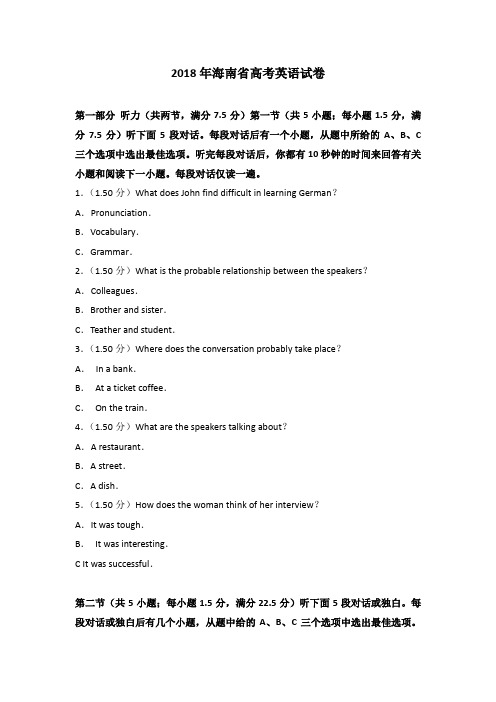
2018年海南省高考英语试卷第一部分听力(共两节,满分7.5分)第一节(共5小题;每小题1.5分,满分7.5分)听下面5段对话。
每段对话后有一个小题,从题中所给的A、B、C 三个选项中选出最佳选项。
听完每段对话后,你都有10秒钟的时间来回答有关小题和阅读下一小题。
每段对话仅读一遍。
1.(1.50分)What does John find difficult in learning German?A.Pronunciation.B.Vocabulary.C.Grammar.2.(1.50分)What is the probable relationship between the speakers?A.Colleagues.B.Brother and sister.C.Teather and student.3.(1.50分)Where does the conversation probably take place?A.In a bank.B.At a ticket coffee.C.On the train.4.(1.50分)What are the speakers talking about?A.A restaurant.B.A street.C.A dish.5.(1.50分)How does the woman think of her interview?A.It was tough.B.It was interesting.C It was successful.第二节(共5小题;每小题1.5分,满分22.5分)听下面5段对话或独白。
每段对话或独白后有几个小题,从题中给的A、B、C三个选项中选出最佳选项。
听完每段对话或独白前,你将有时间阅读各个小题,每小题5秒钟;听完后,各小题将给出5秒钟的作答时间。
每段对话或独白读两遍。
6.(3.00分)听第6段材料,回答下列各题.(1)When will Judy go to a party?A.On Monday.B.On Tuesday.C.On Wednesday.(2)What will Max do next?A.Fly a kite.B.Read a magazine.C.Do his homework.7.(3.00分)听第7段材料,回答下列各题.(1)What does the man suggest doing at first?A.Going to a concert.B.Watching a movie.C.Playing a computer game.(2)What do the speakers decide to do?A.Visit Mike.B.Go boating.C.Talk a walk.8.(4.50分)听第8段材料,回答下列各题.(1)Which color do cats see better than humans?A.Red.B.Green.C.Blue.(2)Why do cats bring dead birds home?A.To eat them in a safe place.B.To show off their hunting skills.C.To make their owners happy.(3)How does the man sound at the end of the conversation?A.Grateful.B.Humorous.C.Curious.9.(6.00分)听第9段材料,回答下列各题.(1)Who is Macy?A.Ed's mother.B.Ed's teacher.C.Ed's friend.(2)How does Ed usually go to kindergarten?A.By car.B.On foot.C.By bus.(3)What does Ed enjoy doing at the kindergarten?A.Telling stories.B.Singing songs.C.Playing with others.(4)What do the teachers say about Ed?A.He's clever.B.He's quiet.C.He's brave.10.(6.00分)听第10段材料,回答下列各题.(1)At what age did Emily start learning ballet?A.Five.B.Six.C.Nine.(2)Why did Emily move to Toronto?A.To work for a dance school.B.To perform at a dance teacher.C.To learn contemporary dance.(3)Why did Emily quit dancing?A.She was too old to dance.B.She failed to get a scholarship.C.She lost interest in it.(4)How does Emily feel about stopping training?A.She's pleased.B.She's regretful.C.She's upset.第二部分阅读理解(共两节,满分30分)第一节(共4小题;每小题6分,满分30分)阅读下列短文,从每题所给的A、B、C和D四个选项中,选出最佳选项。
- 1、下载文档前请自行甄别文档内容的完整性,平台不提供额外的编辑、内容补充、找答案等附加服务。
- 2、"仅部分预览"的文档,不可在线预览部分如存在完整性等问题,可反馈申请退款(可完整预览的文档不适用该条件!)。
- 3、如文档侵犯您的权益,请联系客服反馈,我们会尽快为您处理(人工客服工作时间:9:00-18:30)。
2013年普通高等学校招生全国统一考试(海南卷)英语本试卷分第Ⅰ卷(选择题)和第Ⅱ卷(非选择题)两部分。
考试结束,将试题卷和答题卡一并交回。
第Ⅰ卷注意事项:1.答第Ⅰ卷时,考生务必将自己的姓名、准考证号填写在答题卡上。
2. 选出每小题答案后,用2B铅笔把答题卡上对应题目的答案标号涂黑,如需改动,用橡皮擦干净后,再选涂其他答案标号框。
不能答在试卷上,否则无效。
第一部分英语知识运用(共两节,满分45分)第一节单项填空(共15小题:每小题1分,满分15分)从A、B、C、D四个选项中选出可以填入空白处的最佳选项,并在答题卡上将该选项涂黑。
例:It is generally considered unwise to give a child he or she wants.A. howeverB. whateverC. whicheverD. whenever答案是B。
【2013新课标II卷】1.--I'm sorry I made a mistake!-- Nobody is perfect.A. T ake your timeB. You're rightC. Whatever you sayD. T ake it easy 【答案】D【解析】考查交际用语。
根据后句“人无完人”可知,前一个人犯错误了,应叫他take it easy (放松)。
【2013新课标II卷】2. Would you like to with us to the film tonight?A. come alongB. come offC. come acrossD. come through【答案】A【解析】考查动词短语辨析。
根据句意,与我们一道去看电影,故选A。
come along with…与…一道。
【2013新课标II卷】3. I was glad to meet Jenny again, I didn't want to spend all day with her.A. butB. andC. soD. or【答案】A【解析】考查并列连词。
根据句意:再次见到Jenny我很高兴,但我不想整天都和她一起度过。
【2013新课标II卷】4. When I arrived, Bryan took me to see the house_ I would be staying.A. whatB. whenC. whereD. which 【答案】C【解析】考查定语从句。
定语从句中stay为不及物动词,故不缺主干成分,用关系副词;先行词为house,指地点,故用关系副词where。
【2013新课标II卷】5.I got to the office earlier that day, the 7:30 train from PaddingtonA. caughtB. to have caughtC. to catchD. having caught【解析】考查非谓语动词。
根据句意,因为我赶上了7:30的车,所以那天我更早地到了办公室,可知赶车发生在到办公室之前,且与主语I之间为主动关系,故使用现在分词完成体表主动完成。
【2013新课标II卷】6. Since nobody gave him any help, he have done the research on his own.A. canB. mustC. wouldD. need【答案】B【解析】考查情态动词。
根据句意,由于没人帮他,因此他定是一个人做的那个调查。
情态动词must表肯定推测。
故选B。
【2013新课标II卷】7. We very early so we packed the night before.A. leaveB. had leftC. were leavingD.have left【答案】C【解析】考查动词时态。
根据so后的并列句“我们前一天晚上就打好包了”,可知,“我们会很早离开”,故使用过去进行时表过去将来的动作。
选C。
【2013新课标II卷】8. The watch was very good, and he 20 percent down for it.A. paidB. costC. boughtD. spent【答案】A【解析】考查动词辨析。
短语pay some money for sth。
故答案选A。
【2013新课标II卷】9. It may not be a great suggestion. But before ______ is put forward, we’ll make do with it.A. a good oneB. a better oneC. the best oneD. a best one【解析】考查形容词比较等级。
句意:这也许不是一个很好的建议,但在提出一个更好的建议之前,我们会设法应付的。
根据句意用比较级。
【2013新课标II卷】10. It was only after he had read the papers Mr. Gross realized the task before him was extremely difficult to complete.A. whenB. thatC. whichD. what【答案】B【解析】考查强调句。
题干可还原为:Mr. Gross realized the task before him was extremely difficult to complete only after he had read the papers,即可判断为强调句,因此填that。
【2013新课标II卷】11 A serious study of physics is impossible some knowledge of mathematics.A. againstB. beforeC. beyondD. without【答案】D【解析】考查介词。
根据句意,如果没有一点数学知识,要认真研究物理是不可能的。
故选D(如果没有).【2013新课标II卷】12. Only by increasing the number of doctors by 50 percent properly in this hospital.A. can be the patientsB. can the patients be treatedC. the patients can be treatedD. treated can be the patients【答案】B【解析】考查倒装句。
Only+状语(从句)提前放于句首,句子应用不完全倒装,即将助动词can放于主语the patients之前,故答案选B。
【2013新课标II卷】13.Four and half hours of discussion took us up to midnight, and break for cheese, chocolate and tea with sugar.A. a; aB. the; theC.不填;theD. a;不填【答案】A【解析】考查冠词。
第一空表示“四个半”应用four and a half;短语a break表示“休息一会儿”,故答案选A。
【2013新课标II卷】14. It's an either-or situation - we can buy a new car this year or we can go on holiday but we can’t do .A. othersB. eitherC. anotherD. both【答案】D【解析】考查代词。
根据句意:这是一个只能二选一的处境——我们可以今年买一辆新车,或我们去度假,但是我们不可能两件事都做,not…both表不完全否定。
故选D。
【2013新课标II卷】15. -Are you sure you won't come for a drink with us?- , if you insistA. Not at allB. It dependsC. All right thenD.I don't care【答案】C【解析】考查交际用语。
根据第二个人的回答,“如果你坚持的话”,可知应表示勉强赞同,故选C。
第二节完形填空(共20小题;每小题1.5分,满分30分)阅读下面短文,从短文后面各题锁哥的四个选项(A、B、C 和D)中选出可以填入空白处的最佳选项,并在答题卡上将该项涂黑。
Michael Greenberg is a very popular New Yorker. He is not famous in sports or the arts, But people in the streets 16 him, especially those who are 17 .For those people, he is "Gloves" Greenberg. How did he get that 18 ?He looks like any other businessman, wearing a suit and carrying a briefcase (公文箱). But he's 19 _. His briefcase always has some gloves。
In winter, Mr.Greenberg does not 20 like other New Yorkers, who look at the sidewalk and 21 the street. He looks around at 22 .He stops when he 23 someone with no gloves. He gives them a pair and then he 24 ,looking for more people with cold 25 .On winter days, Mr.Greenberg 26 gloves. During the rest of the year, he 27 gloves. People who have heard about him 28 him gloves, and he has many in his apartment.Mr. Greenberg 29 doing this 21 years ago. Now, many poor New Yorkers know him and 30 his behavior. But people who don't know him are sometimes 31 him. They don't realize that he just wants to make them 32 .It runs in the 33 .Michael's father always helped the poor as he believed it made everyone happier. Michael Greenberg feels the 34 .A pair of gloves may be a 35 thing, but it can make a big difference in winter.16.A..know about B. learn from C. cheer for D. look after17. A. old B. busy C. kind D. poor18. A. job B. name C. chance D. message19.A.calm B. different C. crazy D. curious20.A.act B. sound C. feel D. dress21.A.cross over B. drive along C. hurry down D. keep off22. A. cars B. people C. street numbers D. traffic lights23.A.helps B .chooses C. greets D. sees24.A.holds up B. hangs out C. moves on D. turns around25.A.hands B. ears C. faces D. eyes26. A. searches for B. stores up C. gives away D. puts on27. A. borrows B. sells C. returns D. buys28. A. call B. send C. lend D. show29. A. delayed B. remembered C. began D. enjoyed30.A.understand B. dislike C. study D. excuse31.A.sorry for B. satisfied with C. proud of D. surprised by32.A.smart B. rich C. special D. happy33.A.city B. family C. neighborhood D. company34.A.honor B. pain C. same D. cold35.A.small B. useful C. delightful D comforting16.【答案】A【解析】街上的人都知道他。
